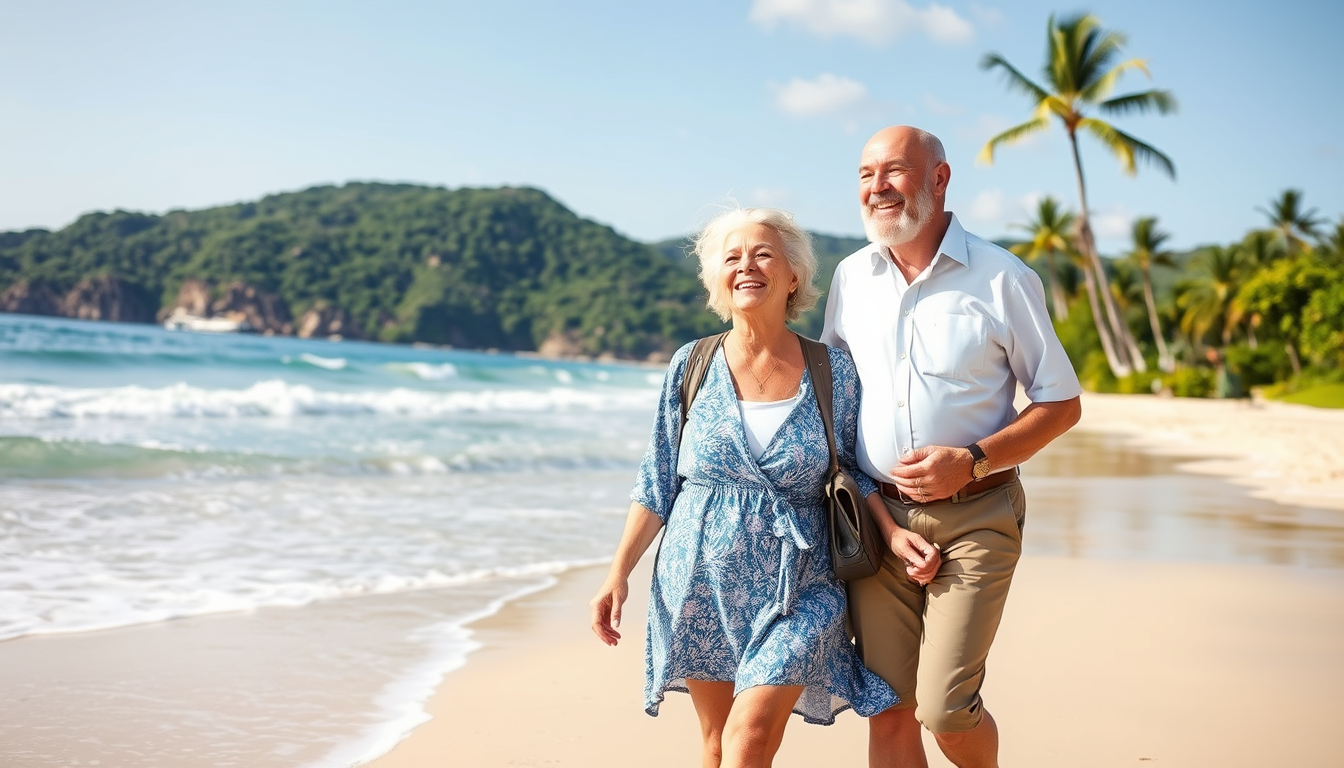Senior travel unlocks freedom, discovery, and unforgettable experiences.
But it also requires smart planning to stay safe, comfortable, and prepared.
From health checkups to packing essentials, older adults face unique travel challenges that demand proactive solutions.
This guide delivers senior travel tips that go beyond the basics—covering insurance, destination selection, comfort strategies, and safety precautions.
Whether you’re cruising through Europe or relaxing at a wellness resort, these insights will help you travel confidently and enjoy every moment.
1. Health Considerations for Senior Travelers
Health should always be a priority when planning travel for older adults.
Many seniors may have pre-existing health conditions or specific medical needs that can require extra attention during a trip.
However, that doesn’t mean you can’t travel smartly and comfortably.
It just requires some extra planning.
Stay on Top of Medications
For older adults, keeping track of your medications is crucial while traveling.
Before you leave, make sure to pack enough medication for the duration of your trip.
Additionally, it’s a good idea to bring extra supplies in case your return is delayed or you encounter any problems with your medication on the road.
Some medications require special storage, so make sure you pack them accordingly to maintain their efficacy.
You should also carry a list of your prescriptions, including the generic names of medications, and any important medical information (such as allergies or health conditions) to share with doctors or pharmacists if needed.
Ready to Escape Your Timeshare?
Timeshare Specialists can help. Fill out this form and get started!

Schedule a Health Checkup Before You Go
Prior to leaving for your trip, schedule a health checkup with your doctor.
Make sure you’re up-to-date on any necessary vaccinations, particularly if you’re traveling internationally, and get clearance if you plan on taking long-haul flights or participating in activities that may put stress on your body.
Your doctor may also suggest that you bring additional items like compression stockings to improve circulation on long flights or provide you with other health-related tips for your specific trip.
Know How to Handle Emergencies
Knowing how to handle health emergencies while traveling is vital.
Identify nearby hospitals or medical centers at your destination, and understand how to contact emergency services.
If you’re traveling internationally, consider purchasing travel insurance that includes coverage for medical emergencies.
Many senior travelers also opt for medical evacuation coverage in case they need to be flown back to their home country for more intensive care.
2. Choosing the Right Destinations for Senior Travelers
While older adults can travel almost anywhere, some destinations are more accommodating to senior travelers than others.
Factors like accessibility, comfort, safety, and climate can make a big difference when choosing the right place to visit.
Opt for Low-Impact Activities
Certain activities can be physically demanding, but there are many destinations that offer low-impact, relaxed options for senior travelers.
For example, cities like Paris, Rome, and Vienna are known for their rich history, art, and culture, with plenty of opportunities for leisurely strolls, museum visits, and scenic boat rides.
Consider places that offer wheelchair access or destinations that focus on wellness and relaxation, such as spa resorts, hot springs, or gentle hiking trails.
If you’re interested in active vacations, look for walking tours or easy cycling routes that focus on sightseeing rather than strenuous activities.
Cruises can also be a great choice as they allow you to explore multiple destinations without the hassle of constantly packing and unpacking.
Weather Considerations
When planning vacation planning for seniors, it’s important to consider climate and weather conditions.
Extreme heat or cold can be challenging for older adults, particularly those with conditions like arthritis or heart problems.
Warm, but not overly hot, climates such as the Mediterranean or coastal areas may offer more comfort for those sensitive to temperature extremes.
Avoid destinations during peak weather seasons, such as summer in tropical destinations or winter in mountain regions, unless you’re comfortable with the conditions.

Freedom From Your Timeshare Begins Now.
It’s as simple as filling out this form.
Accessibility and Accommodation
As a senior traveler, accessibility is a key factor.
Research destinations and accommodations that cater to mobility challenges.
Many hotels, resorts, and tourist attractions now offer senior-friendly amenities, including elevators, ramps, and accessible bathrooms.
It’s also a good idea to book accommodations that are located near public transportation or offer shuttle services to make getting around easier.
3. Travel Insurance: Why It’s Essential for Senior Travelers
For older adults, travel insurance isn’t just an added precaution—it’s a necessity.
When it comes to vacation planning, securing travel insurance that offers adequate coverage can be the difference between a stressful situation and a worry-free vacation.
Coverage for Medical Issues
When booking your travel insurance, make sure the policy covers medical expenses, including emergency medical care and hospitalization while abroad.
Also, confirm that the insurance includes coverage for pre-existing conditions, as many insurers provide this option for seniors.
Travel insurance can also cover trip cancellations or delays due to medical emergencies, providing peace of mind if you need to adjust your travel plans unexpectedly.
Trip Cancellation and Interruptions
Life happens, and sometimes, you may need to cancel or cut your trip short due to unforeseen circumstances.
With the right travel insurance, you can get reimbursed for non-refundable costs such as flights and accommodations if you have to cancel due to illness, injury, or even a family emergency.
Lost or Stolen Items
Travel insurance can also help cover losses related to luggage, personal items, or travel documents that are lost or stolen during your trip.
Since older adults often travel with important documents, such as medical prescriptions, IDs, and credit cards, insurance that covers lost or stolen personal property is essential.
How Insubuy, VisitorsCoverage, and World Nomads Help
When it comes to senior travel and ensuring you are covered during your trip, it’s important to choose a reliable insurance provider.
Here’s how Insubuy, VisitorsCoverage, Travelex, and World Nomads can provide valuable support:
1. Insubuy
Insubuy is one of the leading travel insurance providers for international travelers, offering a variety of plans that provide comprehensive coverage for medical needs, trip cancellations, evacuations, and more.
They specialize in coverage for senior travelers, offering policies that cater to specific needs such as pre-existing conditions and emergency medical care.
- Trip Cancellation and Interruption: Insubuy offers coverage for trip cancellation or trip interruption due to medical emergencies, ensuring you’re reimbursed for non-refundable trip costs.
- Medical Coverage: Insubuy provides extensive medical coverage, including hospitalization, surgery, and doctor visits related to emergency situations.
- Emergency Evacuation: If you need to be evacuated from your destination due to a natural disaster or health issue, Insubuy’s coverage will handle the expenses.
- Pre-existing Conditions Coverage: For senior travelers with pre-existing conditions, Insubuy offers special plans that provide coverage under certain conditions, so you can travel with peace of mind.
Insubuy’s comprehensive options make it one of the top choices for senior travelers.
Make Your Timeshare Maintenance Fees a Distant Memory
Getting rid of your timeshare is as simple as filling out this form.

2. VisitorsCoverage
VisitorsCoverage provides senior-friendly travel insurance with a focus on global coverage.
Their policies include options that cover medical needs, emergency evacuation, and trip cancellations or interruptions.
- Medical Coverage: With VisitorsCoverage, older adults receive medical coverage for emergency situations abroad, including hospital stays and medical evacuations if needed.
- Trip Cancellation and Interruption: If a medical issue arises before or during your trip, VisitorsCoverage reimburses you for the costs associated with cancellations or interruptions.
- 24/7 Assistance: VisitorsCoverage offers 24/7 customer support to help senior travelers manage any emergencies while abroad, ensuring help is always available when needed.
VisitorsCoverage is ideal for senior travelers looking for reliable support and comprehensive coverage on their journeys.
3. World Nomads
World Nomads is one of the most popular travel insurance providers for adventurous travelers, offering comprehensive coverage for senior travelers who may be engaging in activities like hiking, sightseeing, or even extreme sports.
They cover a range of emergency medical situations, including coverage for natural disasters and medical evacuations.
- Emergency Medical Coverage: World Nomads provides medical coverage for injuries sustained during your trip, including hospitalizations, doctor visits, and treatments.
- Trip Cancellation: If a natural disaster, emergency, or illness forces you to cancel or delay your trip, World Nomads will reimburse you for non-refundable costs.
- Evacuation Services: World Nomads offers evacuation coverage, which is essential in the event that a disaster occurs and you need to be transported to safety.
- 24/7 Emergency Support: Whether you need help with evacuations, rebooking, or finding medical assistance, World Nomads provides round-the-clock support.
World Nomads is ideal for senior travelers seeking more flexibility in their travel insurance, especially for those who enjoy adventurous or off-the-beaten-path travel.
4. Traveling Comfortably: Tips for Staying Relaxed on the Road
Traveling as an older adult doesn’t mean you need to sacrifice comfort.
In fact, staying comfortable while traveling should be a priority to ensure that you can enjoy your vacation to the fullest.
Wear Comfortable Clothing and Shoes
Comfortable clothing is a must for senior travelers.
Consider wearing loose-fitting clothes made from breathable fabrics for long-haul flights or extended car rides.
Also, good footwear is essential, particularly if you plan to do a lot of walking or exploring on foot.
Invest in shoes that provide good arch support, cushioning, and that are easy to walk in, especially if you’re walking through cobblestone streets or uneven terrain.
Plan for Frequent Breaks
When traveling, it’s important to take breaks, especially if you’re visiting multiple destinations.
Older adults may tire more quickly, so plan your itinerary with plenty of downtime in between activities.
You can plan shorter sightseeing trips, enjoy long meals at local restaurants, and spend time relaxing in parks, gardens, or cafes.
Bring Snacks and Hydrate
It’s easy to get dehydrated or hungry while traveling, so make sure to bring snacks like nuts, granola bars, or fruit, and always carry a refillable water bottle.
Hydration is especially important when you’re traveling, as it keeps your energy levels up and helps you avoid fatigue or dizziness from the heat or altitude.
5. Smart Packing Tips for Older Adults
Packing for a trip can be a challenge for anyone, but it can be even more so for older adults who might have medical supplies, extra medications, or mobility aids.
Here are some senior travel tips to help with packing:
Bring Important Documents
Make copies of your passport, visa, and health insurance information.
If you’re traveling internationally, have a copy of your medical records, including details of any pre-existing conditions and prescriptions.
Store these copies separately from the originals in case of loss or theft.
Pack Smart, Not Heavy
Packing light is always a good idea, but it’s even more important for older adults who might have trouble carrying heavy bags.
Roll your clothes instead of folding them to maximize space and minimize wrinkles.
Use packing cubes or zippered bags to keep everything organized, and opt for a suitcase with wheels to reduce the strain of carrying it.
Recommended Products from Travelpro:
- Travelpro Platinum Elite Expandable Spinner Wheel Luggage: This suitcase is lightweight yet durable and comes with easy-glide wheels, perfect for senior travelers who may need to maneuver through airports or uneven surfaces.
- Travelpro Maxlite 5 21-Inch Expandable Spinner: A versatile and lightweight option that fits in most overhead bins, with a sleek design and ample space for packing.
Medication and Medical Supplies
Pack enough medication for the entire trip, plus extra in case your return is delayed.
Carry your medications in their original bottles to avoid confusion at security checks.
If you rely on mobility aids such as canes, walkers, or braces, make sure these are packed securely and easily accessible.
6. Enjoying Your Vacation and Staying Safe
The ultimate goal of senior travel is to enjoy your vacation, but it’s equally important to stay safe while you’re on the road.
Staying aware of your surroundings, especially in unfamiliar places, will ensure that you have a smooth and enjoyable trip.
Keep Your Valuables Secure
Be cautious with your valuables, particularly when traveling in crowded areas or busy tourist spots.
Use a money belt or a cross-body bag with zippers to keep your belongings safe from pickpockets.
Always lock your hotel room, and if you’re leaving valuables in your room, use the in-room safe or a hotel safety deposit box.
Be Mindful of Travel Risks
When traveling, be aware of risks like altitude sickness or dehydration, which can be more common among older adults.
If you’re traveling to higher altitudes, take it slow and allow your body to adjust.
Always consult with your doctor before traveling to high-altitude destinations or extreme environments.
Stay Active and Engaged
One of the best parts of senior travel is staying active and engaged with new surroundings.
Whether it’s taking a leisurely walk in a park, participating in a gentle hike, or exploring cultural sites, staying physically active on your trip is key to making the most of your vacation.
Stay Ready, Stay Safe: Travel Like a Pro
For older adults, travel offers an opportunity to make new memories, explore new cultures, and experience the world like never before.
By staying informed, planning your trip carefully, and using the right travel insurance, you can ensure that your travels are as safe, comfortable, and enjoyable as possible.
By taking proactive steps in vacation planning, staying prepared with the right health precautions, and investing in comprehensive travel insurance, you can avoid many of the pitfalls that sometimes come with senior travel.
With these senior travel tips, you’ll be ready to enjoy every moment of your journey—whether you’re soaking in the sights or relaxing by the beach, it’s all about making the most of your time away.
FAQ – Travel Smart as a Senior: Safety, Insurance, and Comfort Tips That Matter
Is travel insurance necessary for older adults?
Yes—travel insurance is essential for senior travelers.
It unlocks protection against medical emergencies, trip cancellations, and lost items.
Look for policies that include pre-existing condition coverage and medical evacuation options.
Providers like VisitorsCoverage, Insubuy, Travelex, and World Nomads offer senior-specific plans.What health precautions should seniors take before traveling?
Schedule a checkup with your doctor before departure.
Update vaccinations, especially for international travel.
Pack enough medication for your trip, plus extra in case of delays.
Carry a list of prescriptions and medical conditions for emergencies.
Compression socks and mobility aids may support circulation and comfort during long flights.Which destinations are best suited for senior travelers?
Choose destinations with mild climates and accessible transportation.
Cities like Vienna, Rome, and Paris offer cultural depth with relaxed pacing.
Cruises and wellness resorts streamline logistics and support low-impact activities.
Avoid extreme weather zones unless medically cleared.
Look for accommodations with elevators, ramps, and senior-friendly amenities.How can older adults stay comfortable during long trips?
Wear breathable clothing and supportive shoes.
Plan for frequent breaks between activities to avoid fatigue.
Stay hydrated and bring snacks to maintain energy.
Use wheeled luggage to reduce physical strain and streamline mobility.
Choose seating with extra legroom when possible.What should seniors pack for medical needs?
Bring medications in original containers, plus extras.
Include mobility aids like canes or braces if needed.
Carry copies of medical records, prescriptions, and insurance documents.
Store critical items in a separate bag for easy access.
Use packing cubes to organize supplies and reduce stress.How can seniors stay safe while exploring new destinations?
Use cross-body bags with zippers to deter theft.
Avoid carrying valuables in crowded areas.
Lock hotel rooms and use safes for important items.
Know emergency contacts and nearby medical facilities.
Be mindful of altitude, hydration, and fatigue risks.
Stay alert and trust your instincts in unfamiliar environments.








